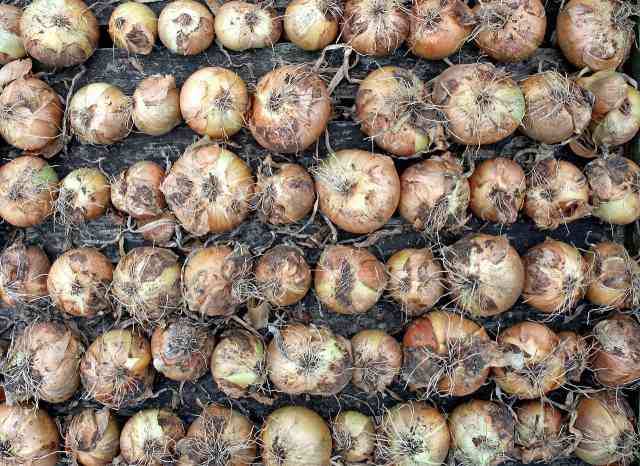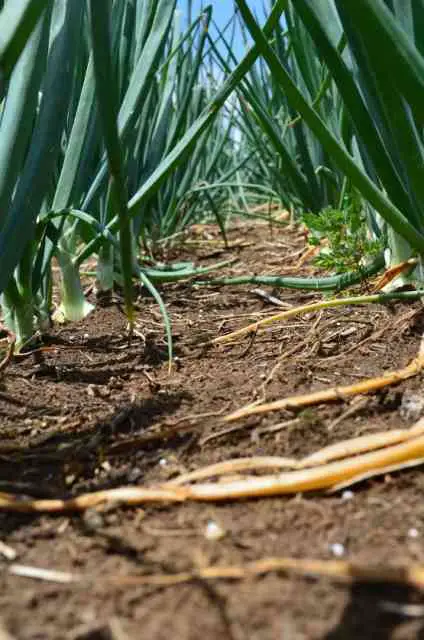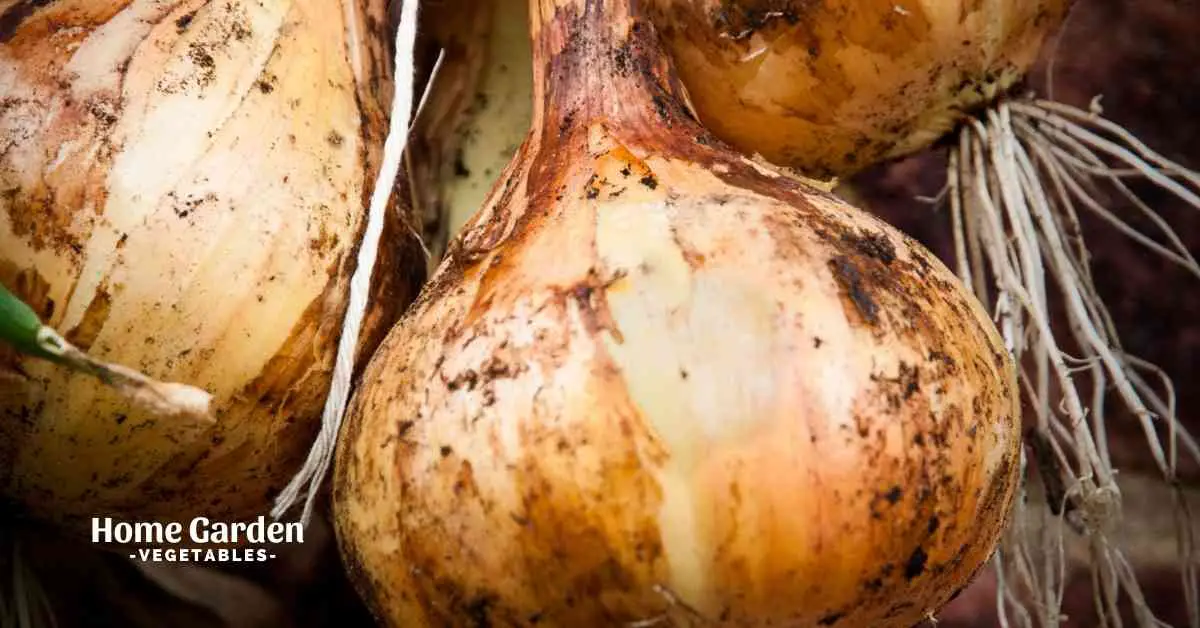Onions are a great vegetable to include in your vegetable garden. Seeds are cheap and there are a large number of delicious varieties available. Home-grown onions are a real treat and a basic kitchen ingredient. If like me you grow onions you will at some point get a few undersized onions. Nothing is worse than caring for a crop for many months only to be disappointed in the size of the crop.
Onions are easy to grow and will produce big, flavorful bulbs. It’s important to take care of a couple of things – sunlight, water, and nutrients.
Reader Poll: What online courses would interest you?
A key factor for high yield and sizable top quality onions is…. soil fertility! Let’s go through how to fertilize onion plants and when is the best time to do so.

Why Is Fertilization Important For Onions?
Onions are related to garlic, scallions and leeks. Like other alliums, onions are shallow-rooted plants. This means that they absorb all their water and nutrients from the topmost layers of the soil.
The shallow roots will not penetrate deep into the soil layers in search of stored nutrients. You will need to help the onions out by replenishing the soil’s nutrients.
Subscribe to our newsletter!
Onions are heavy feeders and demand high amounts of potassium and phosphorus. Onions also need moderate amounts of nitrogen to grow large, good-quality onion bulbs. Minor and trace minerals are also very important. You won’t be able to see the best onion yields without these elements, especially copper, zinc, and magnesium. What you need is an optimal mix of all the essential nutrients to produce the best onions.
Start With Organic Soil
First things first, your onion crop needs a strong start with organic soil.
Most vegetable do much better when grown in soil that has been enriched with organic matter! Its no different for onions. So you need to get more organic matter into the soil. For best results, prepare your soil several months in advance. Do this in advance of any planting. This will make sure there’s ample time for the organic components to blend with the soil and decompose and raise soil’s nutrient levels. There are several types of organic matter that you can amend, including…
- grass clippings
- shredded leaves
- vegetable waste
- fresh manure
If you don’t have months before planting time begins, you can still amend the soil with compost or composted manure.
Make sure any organic matter you use for amending is well-decomposed. This will make sure that nutrients are available to the plants. If organic matter isn’t given a chance to decompose before planting onions, it can expose your crops to pathogens and weeds.
What Is The Best Fertilizer For Onions?
There are many ways to fertilize onion plants. Both organic and chemical fertilization are available.

Organic Fertilization
I always use homemade compost for fertilizing my onions. It’s free and something you can make from your kitchen waste. This is also great for the environment. I have a whole separate article on making your own compost.
Don’t worry if you don’t have any homemade compost. If I don’t have enough I buy a good quality compost suitable for vegetable growing. Most gardeners prefer using compost that’s rich in nitrogen for faster growth.
Spread the compost over top layers of soil using a shovel. Take care not to damage the developing bulbs while incorporating compost in the soil around them. You’ll need to add organic fertilizer two or three times during the growing season.
Chemical Fertilization
Phosphorus and potassium are most important for root development. To ensure its ample supply during the first few weeks of onion’s development, apply a 10-20-10 fertilizer to the bed where you’ll plant the onions.
The roots start developing 3 weeks after planting. Fertilize with a nitrogen-based formula (such as ammonium sulfate or ammonium nitrate) every 2 weeks. Sidedress the plants with the granular fertilizer applied at the rate of ½ cup per 10-feet row.
Remember to water the crop right after feeding.
Maintain consistent moisture in the soil throughout the growing season.
When To Stop Fertilizing Onions Plants?
After midsummer, once the bulbing process starts, don’t apply any more fertilizer. Bulbing usually starts about 4 weeks before the harvesting time. Don’t be tempted to apply fertilizer at this stage as this can cause onions to turn soft and diminish their storage capabilities.
Other Considerations
Fertilization, though very important, isn’t the only thing that your onion crop needs to produce big bulbs. Other requirements are just as important and cannot be overlooked.
Onions perform best when the soil is consistently moist. However, since it’s a root crop, it’s also prone to rotting if the soil is wet. Make sure you supply even moisture to the soil, preferably 1 to 2 inches per week before bulbing and 3 to 4 inches per week once the bulbing starts.
Mulch the ground with grass clipping or other organic material to conserve moisture and control weeds. Maintain a few inches of mulch throughout the growing season, adding more as needed. However, remember to remove the mulch as soon as the bulbing process begins. This will help cure the bulbs for longer storage.
Once the tops fall over, onion plants approach maturity, indicating the time to harvest and cure the bulbs before they’re ready for storage. Lay them out in rows in a ventilated, dry spot away from the sun. Once the onions are completely dry, cut off the foliage to about an inch above the bulb and trim the roots before storing them.
Conclusion
That’s how you fertilize an onion crop to produce big, impressive onion bulbs and leave the neighbors surprised. Start early with rich, fertile soil. Provide ample supplies of nourishment throughout the growing season. Don’t fertilize towards the harvesting phase. Follow this steps and the plants will return your care and efforts with an impressive generous harvest!

